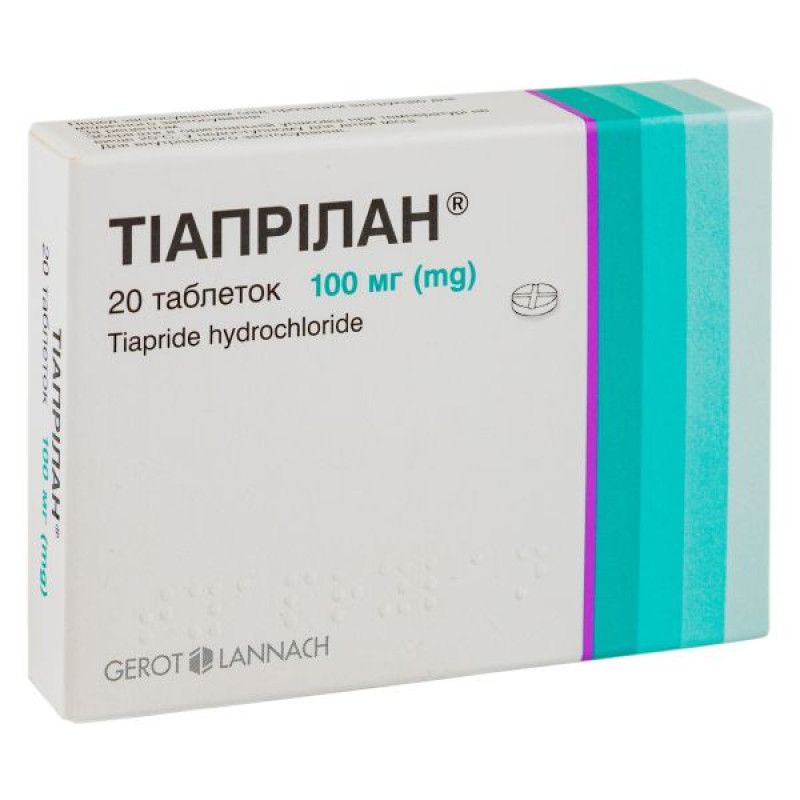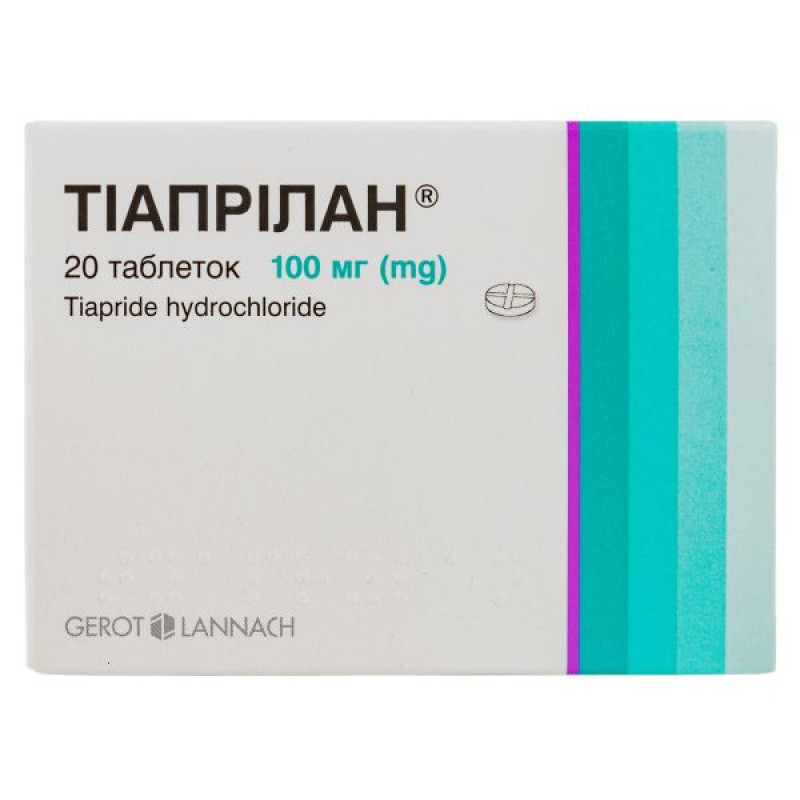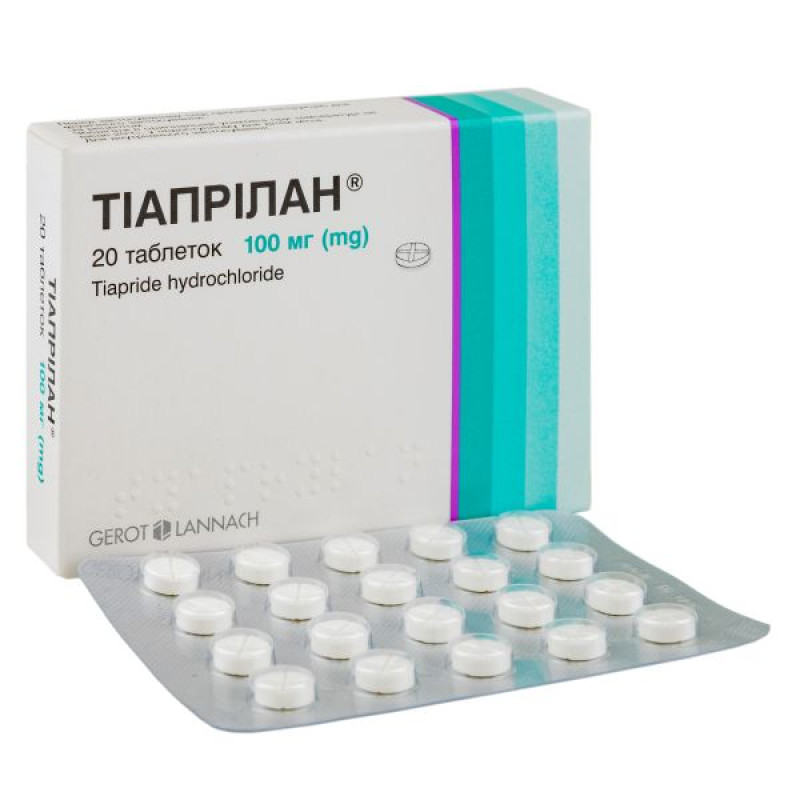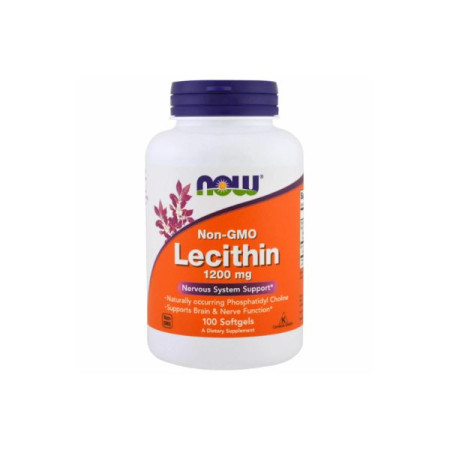Tiaprilan tablets 100 mg blister No. 20

Pharmacological properties
Pharmacodynamics. Tiapride belongs to the substituted o-methoxybenzamides (orthopyramides), a group of substances with central action.
Tiapride is characterized by high affinity for central dopaminergic receptors, especially if they are previously sensitized with dopamine. Tiapride acts via an antidopaminergic pathway, predominantly on dopamine D2 receptors, thereby achieving an antidyskinetic effect of the drug.
Unlike traditional antipsychotics, tiapride has a slight cataleptic effect. Due to these properties, tiapride is used to treat movement coordination disorders of central origin.
Pharmacological and clinical studies have shown that tiapride has antiemetic properties.
Pharmacokinetics. After oral administration of 200 mg of tiapride, C max in blood plasma of 1.3 μg/ml is achieved within 1 hour. The absolute bioavailability of tiapride is 75%. After simultaneous ingestion of food, C max in blood plasma increases by 40%. In the elderly, the absorption of the drug slows down. Tiapride is rapidly distributed throughout the body. It penetrates the blood-brain barrier and the placental barrier without accumulating. Tiapride does not bind to plasma proteins, but binds to erythrocytes to a small extent. T ½ from blood plasma is 5.3 hours. The metabolism of tiapride is weakly expressed. 70% of the dose taken is excreted unchanged in the urine, renal clearance is 330 ml/min. Excretion correlates with creatinine clearance. In patients with impaired renal function, the dose of the drug should be selected according to the degree of damage.
Indication
Tiaprilan is used for dyskinesia and movement disorders such as Huntington's disease, early and tardive dyskinesia.
Psychomotor disorders in the elderly. Psychomotor disorders in chronic alcoholism.
Application
Tiaprilan tablets should be taken whole, without chewing, with sufficient liquid, preferably during meals.
The dose of the drug is set individually. The daily dose is divided into 3 doses.
Dyskinesia and movement disorders
Early dyskinesia: 150-400 mg/day; tardive dyskinesia: 300-800 mg/day.
Huntington's disease: 300-1200 mg/day.
Psychomotor disorders in the elderly: 200-400 mg/day.
Psychomotor disorders in chronic alcoholism: 300-400 mg/day.
Impaired liver or kidney function. For patients with severe renal insufficiency, the dose of the drug should be reduced. A dose reduction and temporary discontinuation of treatment are recommended. For patients with creatinine clearance of 11-20 ml/min, the daily dose should be reduced by 2 times, and with creatinine clearance of 10 ml/min, 1/4 of the standard dose is recommended (the tablet can be divided).
No dose adjustment is required for patients with impaired liver function.
The duration of treatment depends on clinical symptoms.
Contraindication
Hypersensitivity to the active substance or any of the components of the drug; prolactin-dependent tumor, epithelial breast cancer; pheochromocytoma; simultaneous use of levodopa.
Side effects
Side effects are classified by severity and frequency: very common (1/10); common (1/100, 1/10); uncommon (1/1000, 1/100): rare (1/10,000, 1/1000): very rare (1/10,000), including isolated cases.
Within each group, adverse reactions are presented in order of decreasing severity.
It should be noted that in some cases, adverse reactions may be difficult to distinguish from symptoms of the underlying disease.
From the side of the central nervous system: often - dizziness, headache, parkinsonism and parkinson-like symptoms, such as tremor, hypokinesia, increased salivation; rarely - akathisia, dystonia (spasms, torticollis, oculogyric crisis, trismus); very rarely - acute dyskinesia. As with all other antipsychotics, after long-term treatment with tiapride, tardive dyskinesia (characterized by rhythmic involuntary movements, especially of the tongue and / or face) may develop, therefore, close monitoring of the patient is necessary. This has been reported after treatment with the drug for more than 3 months. In such cases, treatment with anticholinergic antiparkinsonian drugs is not indicated, since they either have no effect or may worsen the patient's condition.
The development of neuroleptic malignant syndrome is a potentially life-threatening complication that can occur as a result of treatment with antipsychotic medications.
All these symptoms can be completely eliminated by using anti-Parkinsonian drugs.
Mental disorders: often - fatigue, drowsiness, insomnia, sedation, anxiety, apathy.
On the part of the endocrine system: rarely - tiapride causes hyperprolactinemia, which may be reversible after discontinuation of treatment. The following adverse reactions may occur: galactorrhea, amenorrhea, breast enlargement, breast tenderness, frigidity in women, as well as gynecomastia and impotence in men.
General disorders and administration site conditions: often - asthenia/fatigue; rarely - weight gain; in isolated cases - allergy. In addition, postural hypotension has been reported.
Special care should be taken when using the drug in the following cases:
elderly: like other antipsychotic drugs, tiapride may increase the incidence of sedation and hypotension due to hypersensitivity; in severe cardiovascular diseases (due to possible hemodynamic side effects, especially hypotension); in patients with renal failure (in this case, the risk of overdose should be taken into account); in patients with Parkinson's disease: except in rare cases, tiapride should not be used in patients with Parkinson's disease; in patients with a history of epilepsy: antipsychotics may lower the epileptogenic threshold. Although this phenomenon has not yet been sufficiently studied for tiapride, strict monitoring of patients is necessary.Close monitoring of patients is necessary, as tiapride lowers the seizure threshold.
The drug should not be used in patients with pheochromocytoma, as severe hypertensive crises caused by substances with a similar chemical composition have been reported.
Neuroleptic malignant syndrome. In the event of hyperthermia of unknown origin, treatment with tiapride should be discontinued immediately. Hyperthermia may be a manifestation of neuroleptic malignant syndrome (akathisia, chills, hyperthermia, impaired consciousness, autonomic disorders), which can rarely occur as a result of the use of antipsychotic drugs. This may be especially evident during high-dose therapy (e.g. use in chronic alcoholism).
Use during pregnancy and breastfeeding. There is no experience with the use of tiapride for the treatment of pregnant women, therefore, in such cases, the drug is prescribed only for absolute indications. It is also recommended to reduce the duration of treatment with the drug during pregnancy. If possible, the dose of the antipsychotic drug, as well as the antiparkinsonian agent (if used) at the end of pregnancy should be reduced due to the atropine-like properties of the latter.
Monitoring of the neurological function of the newborn, and in the case of simultaneous use of antiparkinsonian drugs, the digestive function, is recommended.
Tiapride passes into breast milk, so the use of the drug should be avoided during breastfeeding.
Children: Since experience with tiapride in this age group is insufficient, the drug should not be prescribed to children.
Influence on the ability to drive vehicles and operate other mechanisms. Tiapride affects reactivity, as a result of which you should refrain from driving vehicles or operating other mechanisms during the treatment period.
Interactions
During treatment with the drug, simultaneous consumption of alcohol should be avoided, as this may lead to increased sedative effects.
The simultaneous use of tiapride with levodopa should be avoided, since levodopa and antipsychotics can mutually reduce the severity of each other's effects. In the case of the use of antipsychotics in patients with Parkinson's disease, a drug that causes less pronounced extrapyramidal side effects should be chosen (e.g. chlorpromazine, levomepromazine).
When tiapride is used simultaneously with antihypertensive drugs, there is a risk of enhancing their effects (postural hypotension).
Concomitant use of other drugs that depress the CNS (e.g. analgesics and morphine derivatives that suppress cough, most antihistamines, barbiturates, benzodiazepines and other tranquilizers, clonidine) leads to an increase in this effect.
Overdose
Symptoms: experience with overdose of tiapride is insignificant. Overdose may cause fatigue, sedation, coma, arterial hypotension, severe Parkinson's syndrome.
In case of acute overdose, it is necessary to take into account the possible intake of various medications by the patient.
Treatment. There is no specific antidote. Treatment is symptomatic and includes careful monitoring of cardiac and respiratory function.
For severe extrapyramidal symptoms, anticholinergics should be prescribed.
Storage conditions
At a temperature not exceeding 25 °C.
There are no reviews for this product.
There are no reviews for this product, be the first to leave your review.
No questions about this product, be the first and ask your question.














